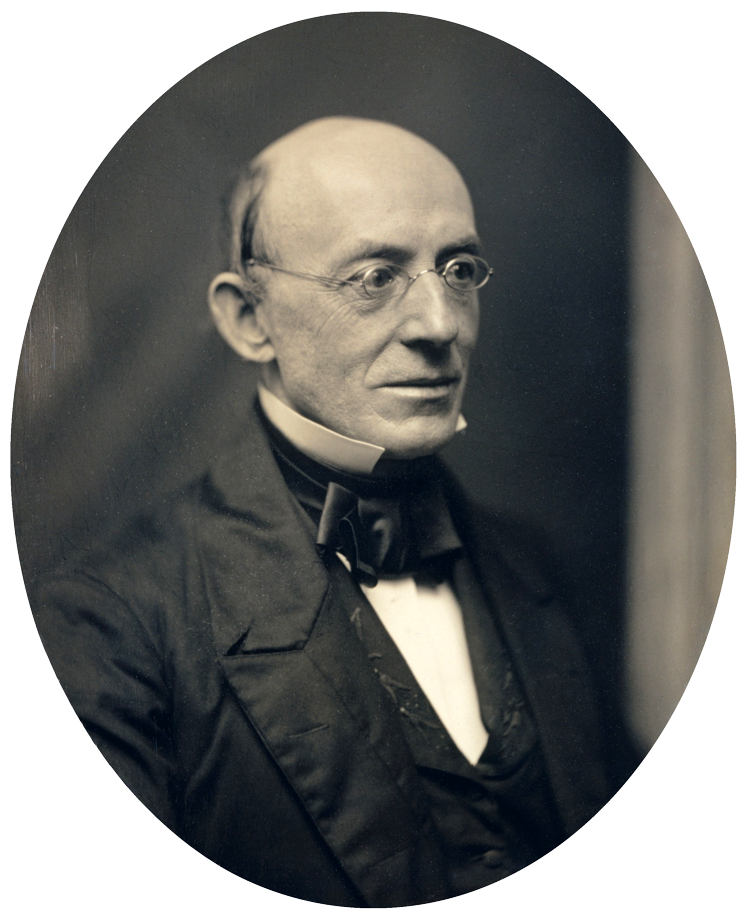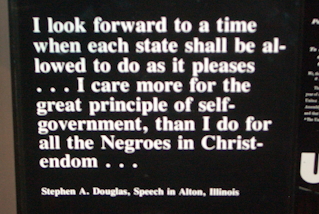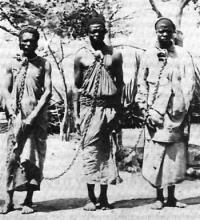Anti-Slavery William Lloyd Garrison Instructs Us
Lessons Learned from the Leading U.S. Abolitionist
 Effective pro-lifers will learn key lessons from the fight in various countries to end slavery. Henry Mayer summarized his definitive biography of American abolitionist William Lloyd Garrison, All on Fire, with the excerpts below. In Garrison's day, the political power, money and influence overwhelmingly supported compromise on slavery including the colonization faction that mostly opposed fighting for abolition but instead raised money to ship willing blacks back to Africa. As today with personhood for the unborn child, various "anti-slavery movements" were actually hostile to abolitionists like Garrison who insisted on fighting for immediate emancipation and equal rights for blacks.
Effective pro-lifers will learn key lessons from the fight in various countries to end slavery. Henry Mayer summarized his definitive biography of American abolitionist William Lloyd Garrison, All on Fire, with the excerpts below. In Garrison's day, the political power, money and influence overwhelmingly supported compromise on slavery including the colonization faction that mostly opposed fighting for abolition but instead raised money to ship willing blacks back to Africa. As today with personhood for the unborn child, various "anti-slavery movements" were actually hostile to abolitionists like Garrison who insisted on fighting for immediate emancipation and equal rights for blacks.
Unlike with abortion, the framers had written tolerance of slavery into the U.S. Constitution itself. So by human standards, Garrison's principled fight against all the pragmatic "anti-slavery but anti-abolition" compromises seemed futile. But as Martin Luther King Jr. paraphrased Theodore Parker in his "Of Justice and the Conscience" from 1853, "the arc of the moral universe is long but it bends toward justice." For truth eventually wins out. And if pragmatism means "what works," then Garrison's uncompromising moral stand was also the only true pragmatic position. Thus biographer Mayer captured this great encouragement that the personhood movement takes from Garrison, for as he wrote:
Of all the pre-war political conceptions about slavery that contended for supremacy:
- states' rights
- three-fifths clause
- Missouri Compromise
- [colonization]
- toleration but non-extension
- popular sovereignty
it was Garrison's program of immediate emancipation through the repudiation of the proslavery constitutional compromise... that prevailed.
The undeniable parallel to today's battle for the unborn appears as a pro-life industry has arisen which raises millions of dollars but opposes the personhood movement and anyone who fights for the right to life of the unborn child. The force of truth is on the child's side as it was on Garrison's side when, against all odds, his principled view won out over the more popular, compromised alternatives.
In this Garrison biography these abolitionist parallels to today's political struggle fly off every page. Those who don't learn from history repeat it. The battle within the battle, where "anti-slavery" camps fought against abolition, is reenacted today as "conservatives" regulate abortion but oppose personhood. The battlefield is the heart and soul of the pro-life movement.
In the preface summarizing his 700-page triumphal account of America's leading abolitionist, Henry Mayer could have been writing about the struggle between the personhood movement and a pro-life movement which has been hijacked and turned into an industry for financial and political gain by politicians, lawyers, and fundraisers who see opportunity only in morally-compromised exceptions and regulations:
All on Fire is a book about an agitator and its argument can be simply stated, William Lloyd Garrison, 1805-1879, is an authentic American hero who, with a biblical prophet's power and a propagandist's skill, forced the nation to confront the most crucial moral issue in its history.
He inspired... a collaboration of ordinary people, stirred by injustice and committed to each other, who achieved a social change that conventional wisdom first condemned as wrong, and then ridiculed as impossible.
He boldly coupled his demand for immediate emancipation with an insistence upon equal rights for black people, a principled stand whose moral clarity eluded every prominent political figure of his era.
The tension created by significant social movements is always resisted and condemned... [W]hen Garrison founded The Liberator and dedicated it to the immediate abolition of slavery and the realization of equal rights for all, the president of the United States, like all but two of his predecessors, owned black people as property, every presidential candidate belonged to a philanthropic organization committed to freeing only those slaves who would resettle in Africa, and every politician believed strongly that, as a matter of both constitutional law and social reality, the question of slavery in the states [see ARTL's Ron Paul Profile] stood outside the competence of the national legislature.
His career separates the insiders, who think progress comes from quiet lobbying within the halls of power, from the outsiders, who insist that only public manifestations of dissatisfaction can overcome institutional inertia. Garrison audaciously believed that a citizen could be more influential by deciding not to vote, and that a leader could be more faithful to his constituency, by refusing to hold office. He took the biblical injunctions seriously enough to endure the wrath of clergymen and that put him at odds not only with conventional politicians but with the convention of political compromise itself. He defied public opinion in an effort to change it, condemned political parties and the churches in an endeavor to influence them, and once publicly burned the U.S. Constitution...
It comes as a surprise to realize that of all the antebellum [pre-war] political conceptions about slavery that contended for supremacy -- states' rights, three-fifths clause, Missouri Compromise, [colonization,] toleration but non-extension, popular sovereignty -- it was Garrison's program of immediate emancipation through the repudiation of the proslavery constitutional compromise... that prevailed.
For... all the genuine ambiguities of its predicament, the inescapable truth is that the slaveholding South would not relinquish its property in human beings and chose instead to close itself off from abolitionist influences... Northerners shared in this acquiescence and this guilt for many decades, as Garrison tirelessly pointed out. [But] his agitation gradually changed the paradigm of Northern politics to admit the moral argument against slavery..."
 The museum beneath the St. Louis Arch displays a plaque with a quote from Stephen A. Douglas. This Democratic politician championed states' rights. Though some argue on scant evidence that Douglas was personally opposed to slavery, he officially defended the unjust institution, and passed compromised incremental legislation that might limit the spread of slavery. In the 1860 election this pro-slavery politician was viewed as anti-slavery by Southern Democrats (much like today's Democrats view the demonstrably pro-abortion Mitt Romney). One of the "anti-slavery" compromises that Garrison faced is captured by a plaque at the museum beneath the St. Louis Arch championing states' rights. However, no state has sufficient authority to nullify the God-given inalienable rights to life and liberty (for neither slavers nor unborn children). Because Douglas rejected this, in 1858 he said, "I look forward to a time when each state shall be allowed to do as it pleases. If it chooses to keep slavery forever, it is not my business, but its own; if it chooses to abolish slavery, it is its own business, not mine. I care more for the great principle of self-government, than I do for all the Negroes in Christendom." Ron Paul has put his supporters in the awkward position of siding with Douglas, and wrongly claiming that states' rights supersede the God-given inalienable rights of life and liberty. If states have the right to permit the systematic killing of children, as in Ron Paul's view, then they would also have the right to deprive any other class of citizen of life and liberty. However, they have no such right, because human rights supersede states' rights.
The museum beneath the St. Louis Arch displays a plaque with a quote from Stephen A. Douglas. This Democratic politician championed states' rights. Though some argue on scant evidence that Douglas was personally opposed to slavery, he officially defended the unjust institution, and passed compromised incremental legislation that might limit the spread of slavery. In the 1860 election this pro-slavery politician was viewed as anti-slavery by Southern Democrats (much like today's Democrats view the demonstrably pro-abortion Mitt Romney). One of the "anti-slavery" compromises that Garrison faced is captured by a plaque at the museum beneath the St. Louis Arch championing states' rights. However, no state has sufficient authority to nullify the God-given inalienable rights to life and liberty (for neither slavers nor unborn children). Because Douglas rejected this, in 1858 he said, "I look forward to a time when each state shall be allowed to do as it pleases. If it chooses to keep slavery forever, it is not my business, but its own; if it chooses to abolish slavery, it is its own business, not mine. I care more for the great principle of self-government, than I do for all the Negroes in Christendom." Ron Paul has put his supporters in the awkward position of siding with Douglas, and wrongly claiming that states' rights supersede the God-given inalienable rights of life and liberty. If states have the right to permit the systematic killing of children, as in Ron Paul's view, then they would also have the right to deprive any other class of citizen of life and liberty. However, they have no such right, because human rights supersede states' rights.
The Strengthening of Garrison and Wilberforce:
Garrison began by advocating for gradual emancipation. He soon realized though the moral failure of any "pragmatic" excuse to postpone advocating for justice for all human beings. Eventually, William Garrison helped even Britain's celebrated Christian abolitionist, William Wilberforce, clarify his own commitment to principle and opposition to compromised incrementalism. In a related historical note, in New York City at Carnegie Hall, Wintley Phipps gave a moving tribute to the Christian conversion of Willberforce's mentor and author of the lyrics of Amazing Grace, former ship's captain in the slave trade, John Newton.
 The popular verse reminiscent of the slavery battle was not part of the original lyrics:
The popular verse reminiscent of the slavery battle was not part of the original lyrics:
My chains are gone
I've been set free
My God, my Savior has ransomed me
And like a flood His mercy reigns
Unending love, Amazing grace
And consider then from Colorado Right To Life's blog by Bob Kyffin:
In Eric Metaxas’ Wilberforce biography, Amazing Grace, he notes that Wilberforce became disenchanted with the incremental method, feeling it was counterproductive. He had hoped incremental improvements would lead inherently to emancipation. "But now, in 1818, it could be seen that this hope had been naïve. So once again, the course was clear: immediate emancipation by political means."
Today, we have the benefit of this lesson, and similar lessons from the United States’ abolition movement, to show us the superiority of principle over compromise. We must not reject these lessons of history!
The ultimate proof of Wilberforce’s commitment is his stand on abolition in the United States. Near the end of his life, an incremental anti-slavery society (a "colonization" faction) was able to secure Wilberforce’s endorsement by leading him to believe they were for an absolute end to slavery in America. However, the American absolutist William Lloyd Garrison arrived in England soon after, and explained the relative positions of anti-slavery societies to Wilberforce. He was greatly angered, revoked his earlier statement, and publicized an endorsement of Garrison instead.
Wilberforce and Incrementalism:
The end-of-the-slave-trade "incrementalism" that Wilberforce long fought for was fundamentally unlike the "compromised incrementalism" of the pro-life industry. To illustrate, those today in 2018 and beyond who nobly fight to end "human trafficking" are not thereby inherently assenting to prostitution, sexual exploitation, slavery, etc. Thus it is an exaggeration to compare Wilberforce ending the slave trade with "pro-life" abortion regulations which all end with, "and then you can kill the child." (See first, AmericanRTL.org/regs and then see andthenyoucankillthebaby.com.) Even if Roe v. Wade were merely overturned, our own regulations would keep such murder "legal" in that they typically state, "Abortion shall be prohibited except when performed under the following circumstances..." (See this at 39:25 into our classic Focus on the Strategy video.)
Fast forward 18 decades from Garrison's 1833 meeting with Wilberforce. Today the definitive source for explaining the relative positions of the anti-abortion camps is the online repository of the actual and often shocking records of "pro-life" politicians, leaders, and organizations compiled at Pro-life Profiles.
Dred Scott & Abortion Abolition:
Finally, another lesson from the fight to abolish slavery that should inform today's pro-life strategy comes from a completely different perspective, from the unjust U.S. Supreme Court itself. The Court has mentioned its own pro-slavery Dred Scott decision 56 times in more than 150 years since issuing their opinion that many blacks and some other humans could be owned as property. American RTL commissioned a Shepardization of the Scott opinion, showing what the Justices have said about their own Court's unjust ruling, and what crucial insight that presents regarding the fight to re-criminalize abortion.
The U.S. Supreme Court's 150-year refusal to acknowledge the immorality, injustice, and illegitimacy in their own Dred Scott continuation of the enslavement of a race of people shows pro-lifers the futility of waiting (for what, a couple centuries?), until the Supreme Court is ready to admit its own atrocity against innocent children and reverse itself on Roe v. Wade. (After all, currently, not a single sitting Justice has ever argued for the right to life of an unborn child.) And the legacy of William Wilberforce and William Lloyd Garrison urges pro-lifers to advocate principled abolition of child killing and enforcement of the God-given right to life.
See also:
- What does the Bible say about Slavery?
- Daniel Webster's Compromise,
- And hear the "George Stephens" abolition radio ad voiced by the president of Colorado RTL and NBC's The Voice super contestant, Biff Gore, with music composed by the late Neil Copley.
Audio file
Quote Source
Please contact ARTL if you can help identify the source of this quote which was emailed to us and attributed to a Senator's wife from the 1800s:
"The greatest evil in the world is slavery, except for abolition." Jan. 20, 2012.
Update
This quote does have a historical basis in the 1800s. On Aug. 15, 2012, one of our own Pro-life Profiles researchers found the following quote in William Lloyd Garrison's The Liberator, in a feature titled Refuge of Oppression which would reproduce anti-abolition comments from ostensibly anti-slavery groups (which today's pro-life, anti-personhood arguments closely parallel). From Garrison's Aug. 7, 1863 edition:
"The editor of the Catholic Telegraph is now a confirmed negrophilist. The negro-worshippers of the country may well clap hands on the acquisition of so able an assistant. ... They have always wanted the priests of the Catholic Church. Thank God that, as yet, they have had but wretched success in making those holy and venerable men the dupes and instruments of their fanaticism! May our beloved clergy never be so lost to reason as to join ranks with [slavery abolitionists like Horace] Greeley, [Wendell] Phillips, Garrison, and the Beechers! Slavery is an evil; but the Greeleyizing of our priests would be a greater evil."
Our researcher, though, asks us to pass on a request for folks to continue looking for a source for the "Senator's wife" quote above.

